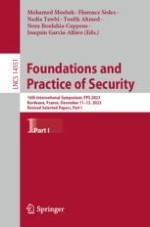2024 | OriginalPaper | Buchkapitel
Following the Obfuscation Trail: Identifying and Exploiting Obfuscation Signatures in Malicious Code
verfasst von : Julien Cassagne, Ettore Merlo, Guy-Vincent Jourdan, Iosif-Viorel Onut
Erschienen in: Foundations and Practice of Security
Verlag: Springer Nature Switzerland
Aktivieren Sie unsere intelligente Suche, um passende Fachinhalte oder Patente zu finden.
Wählen Sie Textabschnitte aus um mit Künstlicher Intelligenz passenden Patente zu finden. powered by
Markieren Sie Textabschnitte, um KI-gestützt weitere passende Inhalte zu finden. powered by
